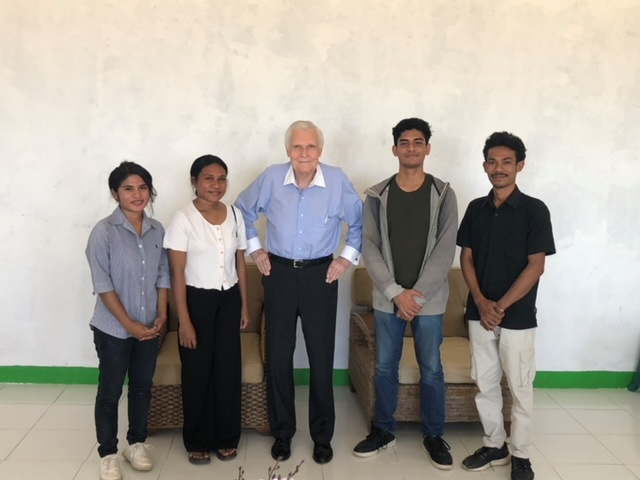Herbert Davis, professor of strategic management and international affairs, has spent much of his academic career involved in strategic management, in both the public and private sectors, with a particular focus on Asia. He extended that engagement thanks to a Fulbright Specialist award that sent him to the island of Timor-Leste, one of the newest nations in Southeast Asia, to help a fledging business school map its future.
The Fulbright funding comes nearly four decades after Davis became the first GW School of Business faculty member named to a Fulbright professorship. At that time, he taught for four months at the University of Dhaka in Bangladesh.
The Fulbright Specialist program was created by the U.S. Department of State in 2002 to provide a pipeline for carrying the knowledge of experts in the United States to institutions abroad. Specialists deliver lectures and seminars, develop training and educational materials, provide consulting and strategic planning support and engage in other knowledge-sharing activities. Davis’ latest Fulbright funding is focused on Timor-Leste’s 8-year-old Joao Saldanha University.
“Initially, it was me sitting down with the president of the Joao Saldanha University and two or three of his senior people to ask what I could do for them,” Davis said. The private school is the first English-speaking business school in the country, and it was seeking a strategic plan that would meet the requirements of the country’s Ministry of Higher Education, earn accreditation from the Association to Advance Collegiate Schools of Business (AACSB) and position the school for partnerships with high-profile U.S. business schools.
“The people who make up this university’s administration had been trained in the U.S. or Australia, and the curriculum is rigorous. They had already done very good work,” Davis said. “They wanted to make sure they had the right organizational structure and they wanted suggestions for going forward.
“My consulting—to help them write their long-term strategic plan—means the GW School of Business has been able to play a key role in the development of a new private university in a place that previously had nothing comparable,” Davis said.
Davis said Timor-Leste’s demographics make a university that teaches in the English language—the language of international business—especially attractive. Most schools in the country teach their courses in Portuguese. Since the median age in the country is only 20, with roughly 40 percent of the population under age 15, the demand for educational opportunities is rising rapidly.
Timor-Leste’s government is keen to see the Joao Saldanha University advance and, even though it is a private institution, is funding 50 scholarships annually.
“This is the most important university when it comes to the professional study of business and economics and English in this country. This university will produce the country’s business leaders and government officials,” Davis said. “Within 10 years, the students in this university are going to hold pivotal jobs.”
Timor-Leste, a former Portuguese colony just north of Darwin, Australia, gained its independence in 1975 but the Indonesian military immediately annexed the territory. In 1999, Timor-Leste’s citizens voted for independence. The declaration of its independence was in 2000 and, in May 2002, it became a new sovereign state.
Davis’ career has centered around institutional development in resource-challenged, conflict and post-conflict countries. He said Timor-Leste has strategic importance for the United States and there is a strong possibility it will be included in the Biden administration’s Indo-Pacific Economic Framework, an initiative aimed at advancing peace and development within the region.
In conjunction with his Fulbright work, Davis is helping to plan a 2025 international conference to celebrate the 25th anniversary of Timor-Leste’s independence and examine what the new country has accomplished and what it needs to do going forward. He said the Harvard University Asia Center and the Australian National University have invited GW to join as an organizer of the conference. The World Bank and USAID may also take part. Davis expects to be on the conference agenda representing the GW School of Business.
As part of the Fulbright grant. Davis also prepared a lengthy report on Joao Saldanha University for the Fulbright Commission. In it, he noted that the education sector is becoming one of the top priorities of the government, in large part because low levels of education have impeded workforce development in Timor-Leste, one of the poorest nations in Southeast Asia. He also underscored the need for the university to step up its enrollment and to more closely engage with the private sector to ensure that business education offerings match employers’ needs.


